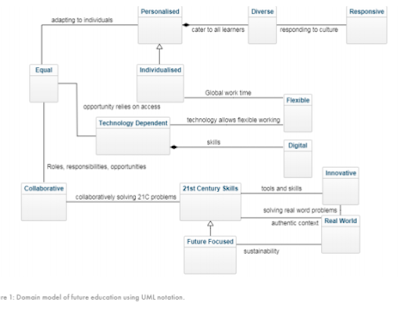Week 32 - Key Change in Reflective Practice
Step 1: What? Identify one key change in my professional practice.
To identify just one key change from the list of 13 concepts identified by Hack Education has been challenging as so much interlinks with the other.
The diagram below supported my thinking and clarification of these links:
I have decided that is the learning I have gained and continue to gain about 21st Century Skills that has made the most change in my practice. This is interesting as when I began my Mindlab journey I was more focussed on the digital technologies I was being introduced to and how these could be implemented with my students.
What I was not prepared for was that underpinning the changes digital technologies was good quality research. I find now that I look for the research that backs up decisions we make on behalf of our learners along with the link to 21st century skills.
The change has effected my planning, teaching and assessments. I have implemented sometimes successfully and at times with challenges flipped learning, blended learning and touching upon gamification. All teaching approaches have engaged my learners and with the research I had read prior to introducing a new approach to the learners I was able to articulate clearly to my team and students why I was approaching our learning in a different way.
This connects directly to both the 'Design for Learning' teaching standard and the 'Teaching' standard. (Our Code Our Standards)
Step Two: Now What? Evaluate the identified change.
Using Osterman & Kottkamp (2015) is a useful framework to evaluate the identified change, by developing new ideas and theories durng the learning process.
Stage One - Problem Identification - This was the lack of engagement of students in their learning.
Stage Two - Data Collection - Observations by me - of particular note is the use of the ladder of inference and how this must be acknowledged in this stage.
Stage Three - Abstract re concepulization - The search for new teaching approaches, blended learning, flipped learning and gamification. The use of design thinking as a problem-solving approach.
Stage Four - Active experimentation - The above approaches all resulted in higher levels of student engagement. The change in behaviour has been changes in how I plan for learning, what teaching approach I could use and identifying 21st century skills.
Step Three: What next? Share my next plan.
I want to deepen my understanding of 21st Century Skills and incorporating these into my planning and teaching.
I want to keep updated and make time to read research to stay informed and support my professional development as an educator.
I want to explore ways for my learners to articulate what the 21st century skills are and how progress with these can be recorded and acknowledged.
I want to continue to develop as a leader and be able to inspire and motivate others to travel along their own path as a learner and leader.
I want to continue to stay connected and colloborate with other educators to improve outcomes for all our students.
Thank you Mindlab for this opportunity!
References:
Ministry of Education (2017). Our code, our standards. Retrieved from
https://educationcouncil.org.nz/content/our-code-our-standards
Osterman, K. F., & Kottkamp, R. B. (2015). Reflective practice for educators: professional development to improve student learning. (2nd ed.) New York: Skyhorse Publishing.
Parsons, D.,Lynch, J.,Han, B. & Thorn, R. (2017) Hack Education: Crowdsourcing the future of education in New Zealand.

Comments
Post a Comment